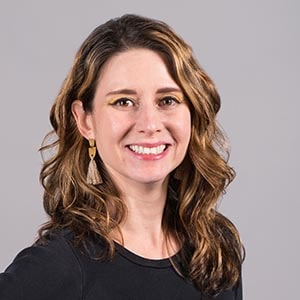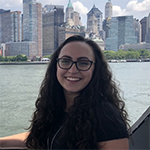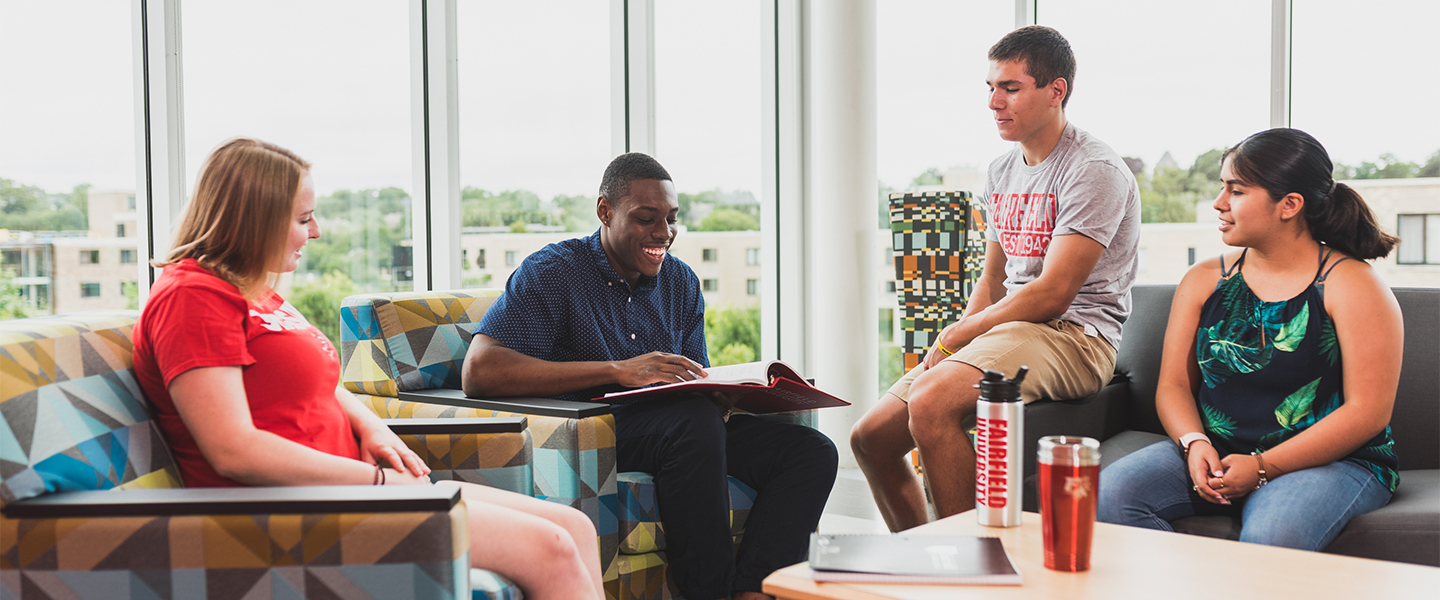Engage
Engage the idea of America by framing questions for research and inquiry.
The purpose of the American Studies program at Fairfield University is for students to engage the idea of America as it has been culturally imagined and contested throughout history, both within and beyond U.S. national borders. Students also consider their own place, engagement, and responsibilities as participants in the unfolding narratives of America within a global context. Interdisciplinary in its goal, the program draws from a wide range of courses in the arts, humanities, and social sciences in order to help students develop the ability to read America, in all its manifestations, as a rich and dynamic cultural artifact.
Offered as both a major and minor, our course variety allows you to create your own line of study, or a double major- combining American Studies with a traditional academic discipline - giving you some extra advantages towards future careers in business, law, education, public service or graduate studies.
American Studies Program at Fairfield University

Associate Professor
Religious Studies
x2801
P: (203) 254-4100
F: (203) 254-4199
admis@fairfield.edu
To earn a 30 credit major (10 courses) in American Studies, students must complete the following:
| One (1) gateway course | |
| AMST 2201 | Roots of American Culture |
| AMST 3990 | Independent Study Research Project |
| America and the World |
| Expression and Imagination in American Culture |
| Gender in American Society |
| Power, Politics, and Institutions in America |
| Race, Ethnicity, and Immigration in American Society |
| Values and Ethics in American Culture |
To earn a 15-credit minor in American studies, students are required to complete five (5) (3 credit) courses:
The American Studies program at Fairfield University engages students in the idea of America as it has been culturally imagined and contested throughout history, both within and beyond U.S. national borders. As part of this engagement, the program explores the idea of America within cultural contexts such as race, ethnicity, gender, sexuality, religion, legal status, environment, and class. At the same time, the program challenges students to think about the processes by which these contexts have shaped America and its identities. Students also consider their own place, engagement, and responsibilities as participants in the unfolding narratives of America within a global context.
An interdisciplinary course of study, the program draws from a wide range of courses in the arts, humanities, and social sciences to help students develop the ability to read America, in all its rich and dynamic manifestations. As part of Fairfield University’s mission, the American Studies program seeks to develop students’ unique abilities and potential and to cultivate a broader commitment to social justice through their exploration of American culture.
1
Engage
Engage the idea of America by framing questions for research and inquiry.
2
Synthesize
Distinguish, summarize, and synthesize the idea of America through the intersections of race, ethnicity, gender, sexuality, religion, legal status, environment, and class.
3
Analyze
Critically analyze and interpret cultural artifacts using interdisciplinary theories, methodologies, and discipline-specific knowledge.
4
Evaluate
Construct oral arguments and generate debate to evaluate the processes that shape and reshape America and its identities.
5
Write
Write informed, critical essays and larger research papers.
6
Examine
Examine and interpret students’ places, engagement, and responsibilities in the unfolding narratives of America, within a global context.
7
Produce
Produce a final culminating project appropriate to the undergraduate and graduate curricula.

Class of '19
Hometown: Quincy, MA
Major: Communication and American Studies
Minor: Women, Gender, and Sexuality Studies
Why did you choose to pursue your undergraduate degree at Fairfield University?
I enjoyed the fact that the small class sizes allowed for personalized learning in each and every subject. Additionally, the University’s Jesuit values have really helped mold my academic, personal, and professional life, as well as the way I approach my thinking. I’ll never forget walking onto campus for the first time and being greeted by individuals who were so positive and enthusiastic. It was clear that students enjoyed going to school at Fairfield, and four years later, I certainly agree!
How/Why did you choose a major in American Studies?
My American Studies major started out as a minor in my second semester. I found it to be a very unique blend of the history, politics, and popular culture, and I found myself learning inside and outside of the classroom. I tend to seek out questions off the ‘traditional path’ of knowledge, and look into themes like memory, imagination, and identity, which are often overlooked in our studies. American Studies allowed me to explore these themes. Eventually, I just kept taking more and more classes and knew it would beneficial to change my minor to a major to be able to really explore my passion.
What are the best academic aspects of the program?
The American Studies program is designed in a way that allows each student to take control of what they are learning. The introductory course, “Roots of American Culture,” is crafted in a way that students are able to understand a wide variety of concepts relating to the field of American Studies and emphasizes just how diverse and interdisciplinary this field of study can be. After this course, students are able to design the major as they see best by selecting courses rooted in politics, English, the arts, sociology, and more. No two American Studies majors are the same, and I think the ability to mold the major into each student’s specific interests is what really pushed me to declare my American Studies major.
What attributes regarding the faculty did you find particularly helpful/ encouraging?
All of my professors have proven to be incredible sources of knowledge. They challenge me to ask broader questions and are supportive of my academic interests. Because American Studies is an interdisciplinary major, the faculty members represent a variety of different fields. Yet they all hold a common interest in making sure my studies are truly interdisciplinary, and that I am utilizing other aspects of my learning both in and out of the classroom. The faculty push you - the questions they ask are meant to prompt the student to ask their own. I have really appreciated the creative liberties I have been offered to make my American Studies major exactly what I want it to be.
Describe a favorite course or project you worked on as part of the program how it helped your academic growth.
I was given a unique opportunity to conduct research on slavery in colonial Fairfield County in collaboration with the late Dr. Vincent Rosivach. The overarching goal for this project was to compile a database of slaves and slave-owners in colonial Fairfield. As with much of the New England slave-holding colonies, Fairfield’s slavery records were messy and incomplete, unlike records in the south that were kept as accurate as possible due to the impact slavery had on the economic success of the Southern planter. This project was designed to reclaim the lives of the slaves of Fairfield who were lost to incomplete historical records and to create a more accurate representation of what slavery was like in colonial New England. This includes documenting previously undocumented individuals, tracking movements of slaves from household to household, connecting families, and more.
Since Dr. Rosivach’s passing last year, my partner Alec Lurie and I have taken the responsibility of completing the project upon ourselves, and it has been named the “Vincent J. Rosivach Register for Slaves in Fairfield, Connecticut 1639-1820” in his honor. It has challenged us to develop a better understanding of how a research project of this caliber should be done, with support by members of the University and Historical societies of the surrounding area. By using Fairfield as a case study, we have been able to develop a greater understanding of slavery trends in the north. The Register hopes to streamline all the information into a conclusive, all-encompassing database, in order to ensure that all persons formerly enslaved in Fairfield are accounted for, for posterity. While we know we may not collect information about every person, we are confident that the register will lay groundwork for future historians to expand upon this research.
American Studies majors follow no single path after graduation. Many go on pursue doctoral programs in literature and political science, while others have gone on to pursue a law degree at the following schools:
Other recent graduates have gone on to pursue careers in:
Learn how Fairfield's Career Services can support your post-graduate goals, and how our tight-knit alumni network can build career and mentoring opportunities that last a lifetime.

As a Jesuit, Catholic university, Fairfield is dedicated to diversity and inclusion; to radical hospitality in service of racial, social, and economic justice.
Each year, the American Studies program hosts an on-campus conference that features scholarly, multimedia presentations by Fairfield University undergraduate and graduate students that address an timely and relevant theme in past and present U.S. history. Past conference themes have included “Democracy and Citizenship,” “The Divided States of America,” “The History of Protest,” and “Family, Sex, and Gender in American Culture,” to name a few. Each conference culminates with a keynote address delivered by a distinguished scholar in American Studies. Past keynotes speakers have included Professor David R. Roediger (University of Kansas), Professor Jennifer Ladino (University of Idaho), and Professor Matthew Jacobson (Yale University).
The College of Arts and Sciences at Fairfield University is home to a vibrant community of engaged faculty, dedicated staff, industry professionals, and accomplished scholars devoted to the process of innovation and excited by the prospect of producing knowledge in the service of others. Meet the members of our American Studies program.